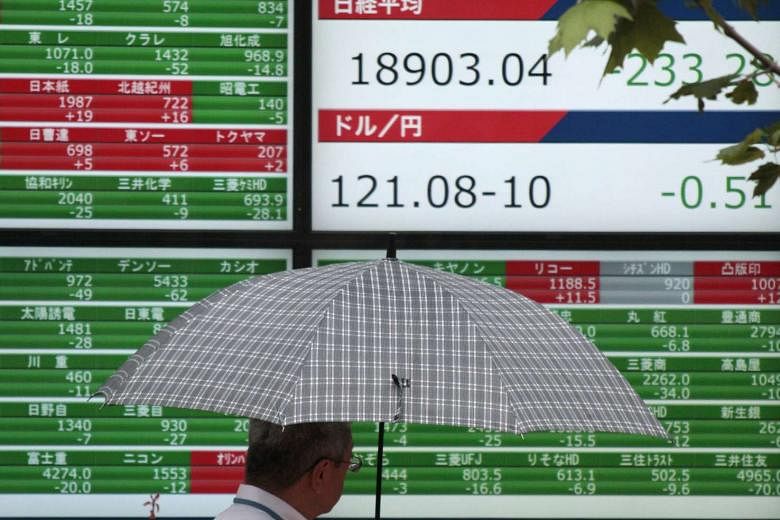Asian shares resumed their bloodletting yesterday after falls in Shanghai shattered the brief respite investors had enjoyed late last week.
The market jitters likely set in even before trading began for the week, as the United States Federal Reserve indicated over the weekend that it might raise interest rates some time in September.
The MSCI Asia ex-Japan index, which tracks stocks across the region except Tokyo, fell 0.4 per cent yesterday, taking its loss for August to 10 per cent.
Tokyo was also weaker, sliding 1.3 per cent, capping an 8.2 per cent decline for the month. Singapore shares slipped 34.5 points, or 1.17 per cent, to 2,921.44 - an 8.8 per cent tumble for the month.
Shanghai shares, which have lost about 26 per cent of their value over the past two months, declined 0.8 per cent yesterday, as investors worried that the Chinese government's efforts to prop up the market will fail.
Chinese regulators have been buying shares since the market began plunging in June in a bid to stem the losses, while also cracking down on those they blame for "destabilising" the markets, including media pundits and short-sellers.
In contrast with the US, which reported surprisingly strong second- quarter growth last week, China's economic outlook also remains cause for concern, noted DBS Bank chief investment officer Lim Say Boon in a note yesterday.
"(China's) manufacturing purchasing managers' index fell to 47.1 in August, while the producer prices index remained on a downward trajectory," he wrote.
"This suggests that the Chinese economy continued to weaken despite the numerous policy measures the government had undertaken to support growth."
A cloudy outlook on the US Fed's plans for monetary policy is also affecting market sentiment.
Speaking on the sidelines of an annual banking conference over the weekend, several Fed officials said the current market volatility could affect its plan to raise rates, but also that they expect the storm to calm down quickly - maybe before the Fed's next meeting later this month.
Mr Nader Naeimi, the head of dynamic asset allocation at AMP Capital Investors in Sydney, told Bloomberg: "The Fed is aware of the market volatility and you wouldn't have thought they would be raising rates into market turmoil. But at the same time, data coming out of the US has been surprisingly resilient and strong. It's very difficult for the Fed."
The spectre of higher US interest rates hammered Asian currencies, which chalked up their biggest monthly loss in three years.
The Bloomberg-JPMorgan Asia Dollar Index, which tracks the region's 10 most active currencies excluding the yen against the US dollar, fell 2.6 per cent in August.
The depreciations were led by the Malaysian ringgit, which weakened 8.6 per cent against the US dollar last month, its worst performance since 1998.
Indonesia's rupiah fell 3.8 per cent against the greenback, the most in 11 months, while the yuan declined 2.7 per cent.
SEE BUSINESS:

